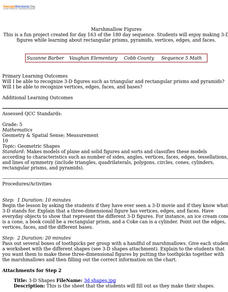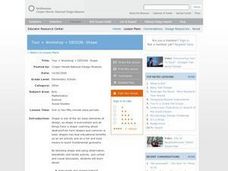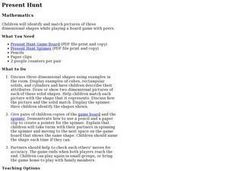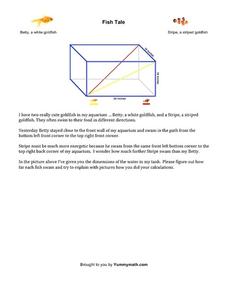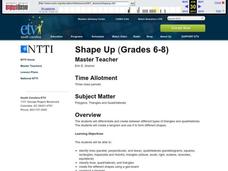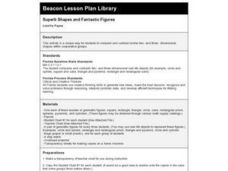Mathematics Vision Project
Module 5: Modeling with Geometry
Solids come in many shapes and sizes. Using geometry, scholars create two-dimensional cross-sections of various three-dimensional objects. They develop the lesson further by finding the volume of solids. The module then shifts to finding...
Curated OER
Marshmallow Figures
Students enjoy making 3-D figures while learning about rectangular prisms, pyramids, vertices, edges, and faces. After a lecture/demo, students use marshmallows, toothpicks and a worksheet imbedded in this lesson to create 3 dimensional...
Curated OER
Using 2 and 3 Dimensional Geometric Shapes
Students explore geometry by participating in a shape identification activity. In this figure dimensions instructional activity, students identify the difference between 2 and 3 dimensional shapes by their vertices and faces. Students...
Curated OER
Nets and 3 Dimensional Figures
For this nets and 3 dimensional figures worksheet, 5th graders look at the 3D figure and the net and mark yes or no if it is an accurate representation.
Curated OER
The Luxor Hotel Contract
High schoolers determine the surface area of the Luxor Hotel, using the square feet of the base, volume, and the volume formula. They create a scale model of the triangular/pyramid shaped hotel.
Curated OER
Graphs, Three-Dimensional Coordinates
In this three-dimensional graphing activity learners identify the coordinates of the vertex of shown figures. The first three shapes show all answers. The following 8 shapes are on coordinate dot paper, with all three axis shown and...
Curated OER
Tour + Workshop = DESIGN: Shape
Ask elementary learners to explore shapes in everyday objects. They will discuss the elements of design and describe the shapes they see in visual images. Students will then design and "build" a new 3D shape. Finally they will show and...
Pennsylvania Department of Education
A Geometric Scavenger Hunt
Fifth graders connect their knowledge of polygons and polyhedrons. In this geometric shapes lesson, 5th graders identify and classify two- and three-dimensional objects. Students construct a polyhedron out of polygons and describe their...
National Security Agency
Classifying Triangles
Building on young mathematicians' prior knowledge of three-sided shapes, this lesson series explores the defining characteristics of different types of triangles. Starting with a shared reading of the children's book The Greedy Triangle,...
Pennsylvania Department of Education
Build What I've Created
n this geometric lesson plan, students define and identify two dimensional shapes based on their attributes. They complete worksheets based on the geometric concepts.
Radford University
Koi Pond
There's nothing fishy about the activity. Future mathematicians design a koi pond from various three-dimensional shapes. They calculate the perimeter, area, and volume of the pond, and then create PowerPoint presentations. They also...
Curated OER
Present Hunt
Learners identify and match pictures of three dimensional shapes while playing a board game with peers. They take turns with their partners in spinning the spinner and moving to the next space on the game board that shows the same shape.
Curated OER
Blocks in a Sock
First graders identify geometric solids. In this shapes and solids beginning geometry lesson, 1st graders reach into a bag and identify the geometric solid they feel. Students describe shape attributes and match two dimensional shapes to...
Curated OER
Shapes Galore!
First graders explore two-dimensional shapes. Individually, children follow directions to draw shapes. Learners use shaving cream, geoboards, yarn, marshmallows, and toothpicks to create shapes. As a class, 1st graders brainstorm...
Curated OER
Using the Web to Explore Shapes
Third graders research the Internet to locate geometric designs in familiar buildings. They review shapes, solids, angles and symmetry as they research websites of familiar buildings in Louisville. They record the information they see...
Curated OER
Geometry in A Box
Students identify 3-dimensional geometric shapes and list the characteristics of each. Using modeling clay, they create their own models of specified geometric shapes. Students create and design a box to store their geometric models.
Curated OER
Identify Shapes and Matching Parts
Young scholars identify real world objects as shapes they have learned. In this 3-D shapes worksheet, students identify shapes such as a cube for a box, a sphere for a globe, and a cylinder for a soup can.
Curated OER
2-D and 3-D Presents at Pedro's Party
Fifth graders draw 2-D and 3-D shapes. They sketch and label geometric figures with correct terminology, then explore parallel and perpendicular lines. Pupils sort and classify shapes drawn.
K6 Math
Nets and 3-Dimensional Figures
Three solid figures are lined up down the left side of the page to be compared to three nets down the right side. Learners simply decide if the corresponding net matches the solid figure. Be aware that the publisher's watermark is...
Curated OER
Fish Tale
Here is a cute problem that requires visualizing two-dimensional shapes within a three-dimensional object, and using properties of triangles and the Pythagorean theorem to solve a real-world problem. There is a small mistake in this...
Curated OER
Dinosaur Math
Second graders practice vocabulary related to measurement, mathematics, and dinosaurs. Using the engaging topic of dinosaurs, learners will calculate various information about dinosaurs and use measurement vocabulary. They will also...
Curated OER
Shape Up
Students explore differents types of triangles and quadriaterals. In this polygon lesson, students model identify and compare two and three dimensional geometric figures. Students create tangrams and discover the difference between...
Curated OER
Geometry, Shapes and Public Sculpture
Students explore characteristics of geometric shapes. They observe geometric shapes and forms in public sculpture. Students create a unique sculpture of their own using basic three dimensional shapes. Additional cross curriculum...
Curated OER
Superb Shapes and Fantastic Figures
Students compare and contrast similar two and three dimensional shapes within cooperative groups.



